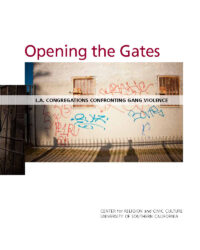In order to recruit a class of fellows for the Institute for Violence Prevention, the Center for Religion and Civic Culture distributed information to its network of congregations and faith leaders. The outreach targeted congregations and faith-based organizations within the three Gang Reduction and Youth Development zones and expanded throughout the region to areas with increasing challenges related to gang activity and youth opportunity. Rev. Mark Whitlock, director of community initiatives and newly appointed executive director of the USC Cecil Murray Center for Community Engagement, and Rev. Dr. Cecil Murray, senior fellow and holder of the John R. Tansey Chair in Christian Ethics at the University of Southern California, used their strong relational connections in South Los Angeles to generate interest in the program. In addition, the center hired two community outreach coordinators, Rev. Frank Jackson and Rev. Jim Ortiz, and partnered with Clergy and Laity United for Economic Justice (CLUE), to recruit African American and Latino candidates for the program and to inform the design and implementation of the program. Ortiz, Jackson and CLUE staff attended numerous clergy and denominational meetings and conducted outreach sessions at seminaries, local clergy associations and alliances, and churches within the three Gang Reduction and Youth Development zones and other areas around the city.
The Institute for Violence Prevention originally planned to work only in the three zones, but as the outreach continued, a substantial number of applicants from other areas began to express their interest. Due to the overwhelming response, IVP staff made the decision to include pastors, gang intervention workers, and lay leaders outside of the original three selected zones. Nearly 150 candidates submitted applications for the program. Each applicant described their current gang intervention or prevention programs and their interest in receiving training in civic engagement, public policy, gang intervention and prevention. A committee reviewed each application and selected 65 participants for the first phase of the program. The first cohort of students completed the institute in September 2009.
The program included a diverse range of participants, including African Americans and Latinos, men and women, those with advanced degrees and those without. Of the 65 participants, 21 were Latinos. In fact, several participants required Spanish translation during classroom sessions. In all, 42 different congregations and nonprofit organizations were represented. Several organizations sent multiple participants in order to increase the impact of the program on their organizational culture. Many participants were bi-vocational, serving as pastors or nonprofit leaders in addition to their regular employment.
A unique aspect of the IVP program was its ability to recruit from the heart of the community. This was not a class of privileged personalities hoping to assist “those in need.” The fellows were selected directly from communities affected by violence, whether within the GRYD zones, adjacent to them, or in other areas. Many of those attending the class had either been former gang members, or have been directly impacted by gang violence. One participant gave an example of why he decided to join IVP: “Just before we came out of church we heard all these Uzi shots. One guy had gotten shot, wrecked the car, was bleeding, running down the street…And to see this just let us know that the area had become unstable for some reason. It turned out it was gangs, one against another.”
In 2010, a select group of the original 65 participants was invited to participate in an “advanced” session. The original program design envisioned admitting a completely new cohort of fellows in the second year. However, after completing the first year of the institute, staff identified additional training needs and decided to create a session that would further solidify skills and strengthen the capacity of the participants to become more closely involved in civic engagement efforts. The second year of IVP included a practicum phase with placement in a community organization. Twenty-seven fellows completed the advanced session.
Richard Flory is the executive director of the USC Center for Religion and Civic Culture.
Donald E. Miller is the co-founder of the USC Center for Religion and Civic Culture.
Brie Loskota is the former executive director (2016-2021) of the USC Center for Religion and Civil Culture.
